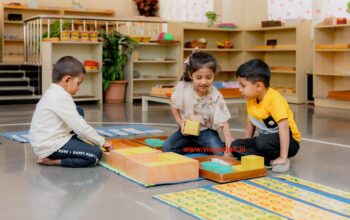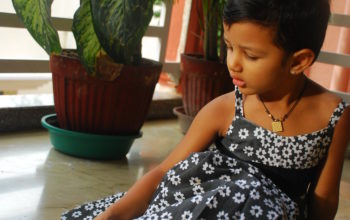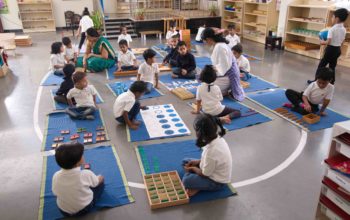
Most young parents are unsure about the right age to start schooling for their children as two extreme views influence their decision. The first view demands children to be admitted to the school as early as 1 ½ years and the second one suggests waiting until they are six years old.
The first opinion stems from the notion catch them young philosophy. Those who believe in this ideology are very cautious and prudent. They tend to provide computers and electronic microscopes for their children as early as at nursery level and enrol them in too many classes at a time. The second opinion is the result of traditional thinking, mainly from grandparents. The question, “We started schooling at six years. What is wrong with our learning?” They reason out, “Child’s mind is very supple. It should not be burdened with too much of learning.” Both these opinions are unscientific.
In this regard, Maria Montessori, the founder of the Montessori method of education, says that schooling should start at 2 ½ years for three reasons:
- The child, immediately after birth, becomes aware of the mother, and then slowly he comes to know about other members of the family, which makes up the child’s first environment. When the child starts walking, he becomes aware of the immediate neighborhood, which is his second environment. Around 2 ½ years, the child needs a larger, more stimulating environment, which is ideally a school. Hence, it is essential to start school around 2 ½ years.
- The child is gifted with several powers that adults don’t have, like Horme (which is similar to willpower), Mneme (which is like memory power), Absorbent Mind, Sensitive Periods, and so on. While some of these powers, like Horme and Mneme, disappear within the first 2 or 3 years, others end by 6 years. The absorbent mind is one such potential, which continues until the child is 6 years old. The absorbent mind enables the child to absorb whatever he comes in contact with, like a sponge, without differentiating good or bad or right or wrong. This absorption is lifelong and photographic. The school environment provides the opportunities for right and necessary absorption, making it essential to start schooling at 2 ½ years of age. Similarly, 2 to 6 years is high time for sensitive periods. Important sensitive periods, like the sensitive period for touch and order, end by three years. While Sensitive Period for touch is crucial for language development, the sensitive period for order is essential for personal development. In order to make use of the sensitive periods completely, children need to start schooling at 2 ½ years.
- Finally, if there are any deviations like timidity, quarrelsomeness, restlessness, disorderliness, disobedience and so on, set in the children before 2 ½ years due to some reason, that can be set right and a foundation for a strong personality can be laid if the child is admitted to a Montessori school by 2 ½ years, as the mind is still in the process of developing.
Apart from the above, in the present-day scenario where both the parents are working, the child has less exposure to speech. In this situation, the school provides an opportunity for the child to speak and express himself in non-threatening ways.
Montessori schools have toddlers programs specially prepared for toddlers from 6 months to 2 ½ years, which are very rare. Parents can also seek admission for their six-year-old children in Montessori Primary schools. However, these children might have lost the preparation they could have had if admitted around 2½ years since the powers that children have are transitory.
Hence, to utilise the Absorbent Mind and Sensitive Periods entirely and provide a conducive environment that lays a foundation for a strong personality, it is essential to start schooling around 2 ½ years.
Tagged age, Kindergarten, Montessori, Nursery, school, schooling, start, Vidyanjali, when


